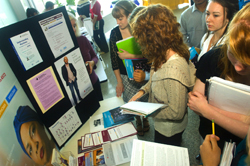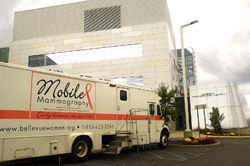UAlbany Cancer Research Center Open House Focuses on Early Breast Cancer Detection
Contact(s): Catherine Herman (518) 956-8150, ([email protected])
 |
| The open house showcased UAlbany's top-flight researchers, state-of-the-art labs, as well as informed visitors of the life-saving science being conducted at the center. (Photo Mark Schmidt) |
The Open House was held on Oct. 2nd at the Center on the University at Albany East Campus.
The event was kicked off at 10 a.m. by several women whose stories of facing cancer in their lives and families are compelling and inspiring, including Paulette McCormick, director of the UAlbany Center for Excellence in Cancer Genomics, and Kathleen Jimino, Rensselaer County Executive.
Other activities included interactive tours of the state-of-the-art labs, where scientists demonstrated their research including how to extract and identify DNA samples using a banana, and how to isolate cancer cells in cultures for research. Video lectures on the newest advances in cancer research from scientists involved directly in examining the origins and pathology of cancer were offered. The Bellevue Mobile Mammography Van also conduced free breast cancer screening.

|
| The Bellevue Mobile Mammography Van was on site for the open house at the Cancer Research Center. (Photo Mark Schmidt) |
Other Center highlights include:
In November 2004, biomedical researcher Douglas S. Conklin and physics professor Carolyn A. MacDonald received awards from the Department of Defense Breast Cancer Research Program (DOD BCRP) for developing novel concepts in breast cancer research. The global award competition offers hope that new research may provide improved prevention, detection or treatments for breast cancer.
In October 2006, the National Institutes of Health Named cancer researcher Thomas J. Begley Outstanding New Environmental Scientist, awarding him $2.2 million to continue research on molecular pathways activated by cancer-causing agents such as cigarette smoke and pesticides.
In August 2007 the Cancer Research Center announced a collaboration with St. Peter's Hospital to research anti-prostate cancer therapies.
In October 2007, Scott Tenenbaum, an assistant professor in biomedical sciences, was awarded a three-year, $2.2 million grant from the National Human Genome Research Institute (NHGRI) to study the organization and function of human genes, which can provide insight into treating, preventing, and diagnosing diseases.
January 2008 saw the hiring of researchers JoEllen Welsh and Martin Tenniswood as Empire Innovations Professors in the Department of Biomedical Sciences. Both, from the University of Notre Dame, specialize in cancer research; Tenniswood studies the hormonal control of cell growth and cell death, particularly as they relate to the development, progression, and treatment of prostate and breast cancer. Welsh uses cellular, molecular, and genomic approaches in conjunction with animal models to study the role of nutritional factors in cancer development and progression.
In March 2008, the National Institutes of Health, National Institute of General Medical Sciences, awarded researcher Chittibabu (Babu) Guda a $227,000 grant to develop computational methods for the identification domain-domain interactions involved in cellular function, followed by experimental validation.
The Cancer Research Center is located on the University at Albany's East Campus, the biotech hub of the University's life sciences research endeavor and a mixed-purpose facility with a dynamic environment for synthesizing the University's educational, scientific, and economic development capabilities with industry and other research institutions. The 87-acre complex is anchored by the University's School of Public Health, and offers more than 350,000 square feet of lab space and associated support and office space.
Students and faculty at the globally-oriented School of Public Health, one of two Centers for Public Health Preparedness in the state created in the wake of September 11, 2001, study the profound health issues facing us today, including the origins of disease such as cancer, the threat of bioterrorism, the lack of affordable and accessible health care, environmental hazards, substance abuse and social violence, the promises and threats of genetic engineering, and the protection of food and water supplies Through its partnership with the New York State Department of Health, the School of Public Health offers students immediate access to internships at the Health Department, Albany Medical College, and variety of other public and private health institutions throughout New York.
[email protected]
